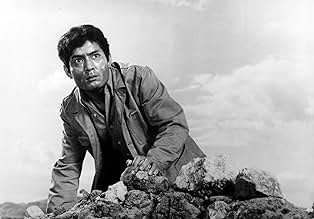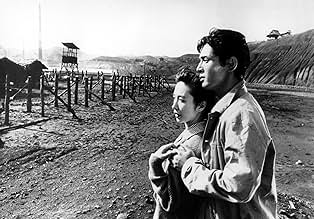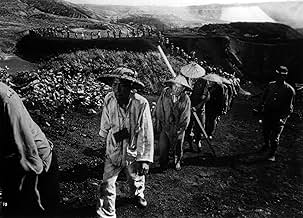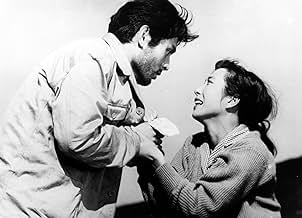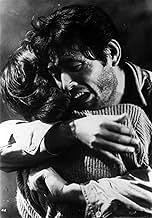IMDb RATING
8.5/10
10K
YOUR RATING
A Japanese pacifist, unable to face the dire consequences of conscientious objection, is transformed by his attempts to compromise with the demands of war-time Japan.A Japanese pacifist, unable to face the dire consequences of conscientious objection, is transformed by his attempts to compromise with the demands of war-time Japan.A Japanese pacifist, unable to face the dire consequences of conscientious objection, is transformed by his attempts to compromise with the demands of war-time Japan.
- Director
- Writers
- Stars
- Awards
- 5 wins & 1 nomination total
Kôji Nanbara
- Kô
- (as Shinji Nanbara)
- Director
- Writers
- All cast & crew
- Production, box office & more at IMDbPro
Featured reviews
7KFL
This film was hugely popular when it came out around 1960, reflecting the fiercely anti-war sentiment of the Japanese at the time. I have read that for a time when it came out, all three parts of The Human Condition (totaling nine and one-half hours) were shown in a single sitting at theaters in northern Tokyo, starting around 10 pm and ending in time for people to catch the trains home the next morning.
While it is a powerful film which portrays much of the suffering and brutality visited on the Chinese in Manchuria by the Japanese war machine, it is not without some rather unlikely plot twists. In particular, Kaji seems somewhat too saint-like to be believable.
It is worth mentioning that the title "The Human Condition" is perhaps misleading. The Japanese word "jouken" corresponding to "condition" is not normally used in a descriptive sense, but rather, as a condition to be fulfilled or satisfied. Thus the title might be better rendered "The Conditions for Being Human"--the implication being that in wartime, the conditions for remaining fully human are elusive at best.
While it is a powerful film which portrays much of the suffering and brutality visited on the Chinese in Manchuria by the Japanese war machine, it is not without some rather unlikely plot twists. In particular, Kaji seems somewhat too saint-like to be believable.
It is worth mentioning that the title "The Human Condition" is perhaps misleading. The Japanese word "jouken" corresponding to "condition" is not normally used in a descriptive sense, but rather, as a condition to be fulfilled or satisfied. Thus the title might be better rendered "The Conditions for Being Human"--the implication being that in wartime, the conditions for remaining fully human are elusive at best.
In the World War II, the pacifist and humanist Japanese Kaji (Tatsuya Nakadai) accepts to travel with his wife Michiko (Michiyo Aratama) to the tiny Manchurian village Loh Hu Liong to work as supervisor in an iron ore mine to avoid to be summoned to the military service. Kaji, who defends communists principles, works with Okishima (Sô Yamamura) and he implements a better treatment to the laborers and improves the mine production.
When the feared Kempetai (The "Military Police Corps", the military police arm of the Imperial Japanese Army from 1881 to 1945) brings six hundred Chinese POWs to the mine, Kaji negotiates with their leaders expecting them to control their comrades. However the methods of Kaji upset the corrupt system in the site, and the foreman Furuya (Kôji Mitsui) plots a scheme to use the naive Chen (Akira Ishihama) to turn off the electrical power of the barbwire fences to allow the prisoners to escape.
When seven prisoners are falsely accused of an attempt of fleeing, a cruel Kempetai sergeant uses his sword to behead the prisoners. When Kaji protests, the POWs react sparing the lives of four prisoners but Kaji is arrested and tortured. When he is released, he is summoned to join the army and accused of being Red.
"The Human Condition – Parts I & II" is the anti-war masterpiece by Masaki Kobayashi. The story is impressively realistic and magnificently shot with top-notch camera work, giving the sensation of a documentary. I bought the box released by the Criterion approximately one year ago, and only today I have just watched the two first DVD with about 400 minutes running time. Tomorrow I will finish watching this masterpiece. My vote is ten.
Title (Brazil): Not Available
When the feared Kempetai (The "Military Police Corps", the military police arm of the Imperial Japanese Army from 1881 to 1945) brings six hundred Chinese POWs to the mine, Kaji negotiates with their leaders expecting them to control their comrades. However the methods of Kaji upset the corrupt system in the site, and the foreman Furuya (Kôji Mitsui) plots a scheme to use the naive Chen (Akira Ishihama) to turn off the electrical power of the barbwire fences to allow the prisoners to escape.
When seven prisoners are falsely accused of an attempt of fleeing, a cruel Kempetai sergeant uses his sword to behead the prisoners. When Kaji protests, the POWs react sparing the lives of four prisoners but Kaji is arrested and tortured. When he is released, he is summoned to join the army and accused of being Red.
"The Human Condition – Parts I & II" is the anti-war masterpiece by Masaki Kobayashi. The story is impressively realistic and magnificently shot with top-notch camera work, giving the sensation of a documentary. I bought the box released by the Criterion approximately one year ago, and only today I have just watched the two first DVD with about 400 minutes running time. Tomorrow I will finish watching this masterpiece. My vote is ten.
Title (Brazil): Not Available
The greatest film ever made! And I've seen many, many films. This even supercedes The Seven Samurai which I consider a masterwork. The Human Condition is 10 hours and in 3 movies. A stunning performance by Tatsuya Nakadai. Find the 3 parts, hie yourself off to a monastery and watch them, with a bit of a breather between each movie. Stroheim's Greed was about 10 hours before the Hollywood hacks cut it back. This one is intact. It is subtitled and not dubbed.
An interesting film that portrays the struggles of an idealistic young Japanese man who is challenged to employ his idealism in the service of the Japanese war effort in WW II. A key aspect of this struggle is the protagonist's struggle within himself. Kaji, the young man, seeks to humanize the brutal conditions at a mining operation in Manchuria. Further complicating matters is the profound sense of national prejudice that shapes the relationships between the various characters. To the workers & Chinese prisoners, regardless of his professed ideals, Kaji is Japanese and therefore an oppressor. Although Kaji tries to win their trust, his own frustration enables him to strike a young Chinese helper, reinforcing the image of the brutal Japanese. This weakness is a key underlying theme. Even late in the film, when he takes a very brave stand against some executions, his effort is a bit late and his stand is successful only when the Chinese prisoners take up the protest. He struggles because her fears he cannot live up to the ideals he expresses.
Kaji is also confronted with the another irony. Although he opposes the war, he has chosen a route of avoidance rather than resistance. This is emphasized early in the film during an evening with a friend who is about to be inducted. His friend comments that, although they opposed the war, neither of them was brave enough to face the penalty for resistance of life imprisonment. Shortly thereafter, he takes the mine job to get a military exemption. Yet, if he is successful, the production improvements in the mine only fuel the Japanese war machine.
A valuable film because it explores areas of the pacific war that are not well know in the west. Also an interesting observation in the danger of half-measures when taking a moral stance. Kaji is ultimately confronted with the fact that you cannot avoid the war, only oppose it or aid it. I look forward to viewing the next film.
Kaji is also confronted with the another irony. Although he opposes the war, he has chosen a route of avoidance rather than resistance. This is emphasized early in the film during an evening with a friend who is about to be inducted. His friend comments that, although they opposed the war, neither of them was brave enough to face the penalty for resistance of life imprisonment. Shortly thereafter, he takes the mine job to get a military exemption. Yet, if he is successful, the production improvements in the mine only fuel the Japanese war machine.
A valuable film because it explores areas of the pacific war that are not well know in the west. Also an interesting observation in the danger of half-measures when taking a moral stance. Kaji is ultimately confronted with the fact that you cannot avoid the war, only oppose it or aid it. I look forward to viewing the next film.
Kobayashi's "The Human Condition" is one of a handful of great anti-war movies. While Japanese film has confronted its own crimes of war more than other cinema, I am only familiar with one other Japanese movie which deals directly with the war & the plight of conscientious objectors: Kurosawa's "No Regrets for Our Youth". Many films deal with the futility of war: "Seven Samurai" & "Yojimbo" come immediately to mind. But "Human Condition" takes on the enormity of war, & the means by which everyone becomes complicit in its total corruption. The hero, though a Conscientious Objector, becomes a colonial occupier, an exploiter of slave labor, an employer of a madam who runs a camp of women & girls impressed into prostitution, & generally runs the gamut of crimes against humanity while trying to maintain his virtue & love's beauty.
Parts II & III also explore the brutality of the army toward its own soldiers, & the complete desecration of the ideals of the Russian Revolution & the cruelty of ordinary Chinese villagers.
"The Human Condition" should be ranked with "Grand Illusion", though what could be as lyrical as the Renoir film? If only this were require viewing in all military academies. If only it were required viewing for all lawmakers & the executive. Is that asking too much?
Parts II & III also explore the brutality of the army toward its own soldiers, & the complete desecration of the ideals of the Russian Revolution & the cruelty of ordinary Chinese villagers.
"The Human Condition" should be ranked with "Grand Illusion", though what could be as lyrical as the Renoir film? If only this were require viewing in all military academies. If only it were required viewing for all lawmakers & the executive. Is that asking too much?
Did you know
- TriviaAccording to Tatsuya Nakadai, a marathon screening of the entire nine-and-a-half-hour "Human Condition" trilogy is held once a year in Japan, and he has once or twice attended these screenings, which are always sold out.
- GoofsAt one point a Japanese guard begins to whip Kao, yet the motions he makes are just a flailing of his arms, visibly missing the actor. Kao retaliates by throwing a rock at the guard, but the rock never strikes the guard. However, the actor playing the guard overreacts as if he has been struck.
- Quotes
Kuroki Shochô: You know, Kaji, theory may be correct and yet not always apply to reality.
Kaji: Then either the theory is wrong or it was incorrectly applied.
- ConnectionsFollowed by The Human Condition II: Road to Eternity (1959)
- How long is The Human Condition I: No Greater Love?Powered by Alexa
Details
- Release date
- Country of origin
- Languages
- Also known as
- Human Condition I: No Greater Love
- Filming locations
- Hokkaido, Japan(Exterior scenes of the Manchurian mine)
- Production companies
- See more company credits at IMDbPro
- Runtime
- 3h 28m(208 min)
- Color
- Sound mix
- Aspect ratio
- 2.35 : 1
Contribute to this page
Suggest an edit or add missing content


